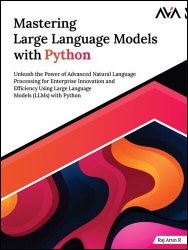Mastering Large Language Models with Python
- Добавил: literator
- Дата: 1-11-2024, 17:20
- Комментариев: 0
 Название: Mastering Large Language Models with Python: Unleash the Power of Advanced Natural Language Processing for Enterprise Innovation and Efficiency Using Large Language Models (LLMs) with Python
Название: Mastering Large Language Models with Python: Unleash the Power of Advanced Natural Language Processing for Enterprise Innovation and Efficiency Using Large Language Models (LLMs) with PythonАвтор: Raj Arun R
Издательство: Orange Education Pvt Ltd, AVA
Год: 2024
Страниц: 554
Язык: английский
Формат: pdf (true), epub (true)
Размер: 65.9 MB, 10.9 MB
"Mastering Large Language Models with Python" is an indispensable resource that offers a comprehensive exploration of Large Language Models (LLMs), providing the essential knowledge to leverage these transformative AI models effectively. From unraveling the intricacies of LLM architecture to practical applications like code generation and AI-driven recommendation systems, readers will gain valuable insights into implementing LLMs in diverse projects.
Covering both open-source and proprietary LLMs, the book delves into foundational concepts and advanced techniques, empowering professionals to harness the full potential of these models. Detailed discussions on quantization techniques for efficient deployment, operational strategies with LLMOps, and ethical considerations ensure a well-rounded understanding of LLM implementation.
Through real-world case studies, code snippets, and practical examples, readers will navigate the complexities of LLMs with confidence, paving the way for innovative solutions and organizational growth. Whether you seek to deepen your understanding, drive impactful applications, or lead AI-driven initiatives, this book equips you with the tools and insights needed to excel in the dynamic landscape of Artificial Intelligence.
Chapter 1 offers an introduction to the world of LLMs, presenting their architecture and a wide array of applications, thereby establishing the significance of these models in AI’s evolution.
Chapter 2 takes a closer look at open-source LLMs, their advantages, challenges, and the pivotal role they play in advancing AI technology, enriched with practical examples and code snippets.
Chapter 3 transitions into the domain of closed-source LLMs, exploring their diverse applications from natural language understanding to AI-generated media, providing insights into models developed by leading organizations.
Chapter 4 focuses on the practicalities of LLM APIs, specifically within the Hugging Face ecosystem, detailing their use in various tasks across NLP, audio processing, and computer vision.
Chapter 5 uniquely addresses integrating the Cohere API in Google Sheets, showcasing the application of LLMs in code generation, supported by real-world examples and exercises.
Chapter 6 introduces the synergistic use of transformers and vector databases for creating dynamic movie recommendation systems, highlighting the technological fusion’s potential beyond entertainment.
Chapter 7 explores AI-powered QA bots, detailing their implementation and the transformative impact they have on customer service, education, and research.
Chapter 8 discusses the quantization of LLMs, offering insights into making these models more accessible and efficient for broader use.
Chapters 9 and 10 dive into fine-tuning and evaluating LLMs, presenting methodologies and practical applications to enhance model performance.
Chapter 11 outlines the operational landscape with LLMOps, providing a blueprint for deploying and managing LLMs at scale, addressing data management, model training, and security.
Chapter 12 details implementing LLMOps in practice using tools such as MLFlow on Databricks, emphasizing model lifecycle management and real-time inference.
Chapters 13 and 14 concentrate on prompt engineering, from basic techniques to advanced design patterns, illustrating how to craft effective prompts for optimized AI interactions.
Chapter 15 addresses the ethical considerations and regulatory frameworks surrounding LLMs, advocating for responsible AI development.
Chapter 16 looks towards the future, exploring emerging trends, use cases, and the societal impact of LLMs, particularly through the lens of Trust-Interpretable Generative AI.
By the conclusion of this book, readers are not just familiarized with the theoretical underpinnings of LLMs but are also equipped with the hands-on experience necessary to implement these models in practical scenarios. Tailored for AI researchers, industry professionals, and academic students, this book serves as a comprehensive guide to navigating the promising yet complex world of Large Language Models, paving the way for innovative applications and ethical practices in the AI domain.
Скачать Mastering Large Language Models with Python
True PDF:
True ePub, PDF (conv):
[related-news] [/related-news]
Внимание
Уважаемый посетитель, Вы зашли на сайт как незарегистрированный пользователь.
Мы рекомендуем Вам зарегистрироваться либо войти на сайт под своим именем.
Уважаемый посетитель, Вы зашли на сайт как незарегистрированный пользователь.
Мы рекомендуем Вам зарегистрироваться либо войти на сайт под своим именем.
